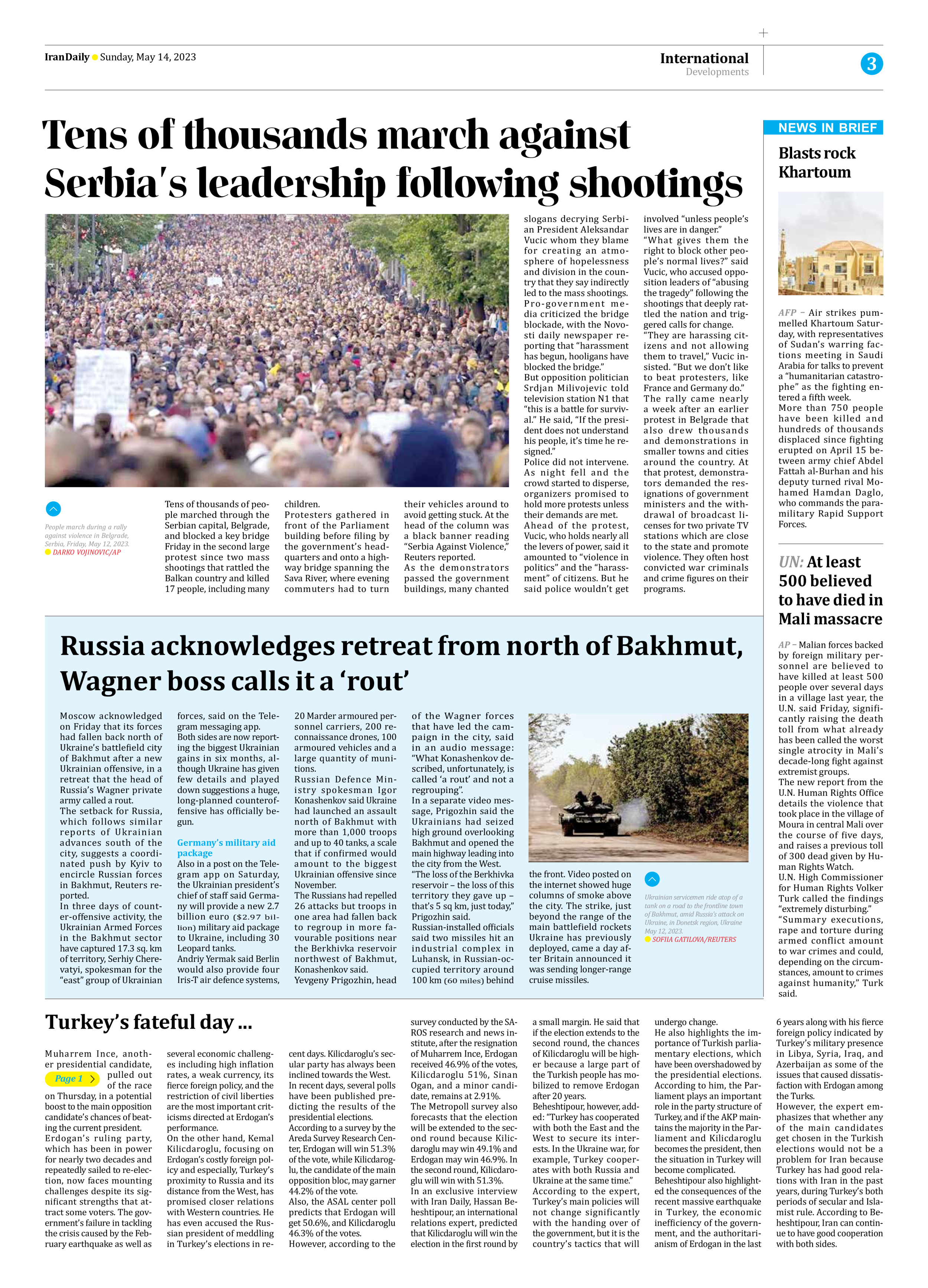
Turkey’s fateful day ...
Page 1
Muharrem Ince, another presidential candidate, pulled out of the race on Thursday, in a potential boost to the main opposition candidate’s chances of beating the current president.
Erdogan’s ruling party, which has been in power for nearly two decades and repeatedly sailed to re-election, now faces mounting challenges despite its significant strengths that attract some voters. The government’s failure in tackling the crisis caused by the February earthquake as well as several economic challenges including high inflation rates, a weak currency, its fierce foreign policy, and the restriction of civil liberties are the most important criticisms directed at Erdogan’s performance.
On the other hand, Kemal Kilicdaroglu, focusing on Erdogan’s costly foreign policy and especially, Turkey’s proximity to Russia and its distance from the West, has promised closer relations with Western countries. He has even accused the Russian president of meddling in Turkey’s elections in recent days. Kilicdaroglu’s secular party has always been inclined towards the West.
In recent days, several polls have been published predicting the results of the presidential elections.
According to a survey by the Areda Survey Research Center, Erdogan will win 51.3% of the vote, while Kilicdaroglu, the candidate of the main opposition bloc, may garner 44.2% of the vote.
Also, the ASAL center poll predicts that Erdogan will get 50.6%, and Kilicdaroglu 46.3% of the votes.
However, according to the survey conducted by the SAROS research and news institute, after the resignation of Muharrem Ince, Erdogan received 46.9% of the votes, Kilicdaroglu 51%, Sinan Ogan, and a minor candidate, remains at 2.91%.
The Metropoll survey also forecasts that the election will be extended to the second round because Kilicdaroglu may win 49.1% and Erdogan may win 46.9%. In the second round, Kilicdaroglu will win with 51.3%.
In an exclusive interview with Iran Daily, Hassan Beheshtipour, an international relations expert, predicted that Kilicdaroglu will win the election in the first round by a small margin. He said that if the election extends to the second round, the chances of Kilicdaroglu will be higher because a large part of the Turkish people has mobilized to remove Erdogan after 20 years.
Beheshtipour, however, added: “Turkey has cooperated with both the East and the West to secure its interests. In the Ukraine war, for example, Turkey cooperates with both Russia and Ukraine at the same time.”
According to the expert, Turkey’s main policies will not change significantly with the handing over of the government, but it is the country’s tactics that will undergo change.
He also highlights the importance of Turkish parliamentary elections, which have been overshadowed by the presidential elections. According to him, the Parliament plays an important role in the party structure of Turkey, and if the AKP maintains the majority in the Parliament and Kilicdaroglu becomes the president, then the situation in Turkey will become complicated.
Beheshtipour also highlighted the consequences of the recent massive earthquake in Turkey, the economic inefficiency of the government, and the authoritarianism of Erdogan in the last 6 years along with his fierce foreign policy indicated by Turkey’s military presence in Libya, Syria, Iraq, and Azerbaijan as some of the issues that caused dissatisfaction with Erdogan among the Turks.
However, the expert emphasizes that whether any of the main candidates get chosen in the Turkish elections would not be a problem for Iran because Turkey has had good relations with Iran in the past years, during Turkey’s both periods of secular and Islamist rule. According to Beheshtipour, Iran can continue to have good cooperation with both sides.







